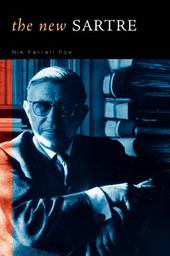
|
New Sartre
Paperback / softback
Main Details
| Title |
New Sartre
|
| Authors and Contributors |
By (author) Nik Farrell Fox
|
| Physical Properties |
| Format:Paperback / softback | | Pages:208 | | Dimensions(mm): Height 234,Width 156 |
|
| Category/Genre | Western philosophy from c 1900 to now |
|---|
| ISBN/Barcode |
9780826461841
|
| Classifications | Dewey:194 |
|---|
| Audience | | Tertiary Education (US: College) | | Professional & Vocational | |
|---|
|
Publishing Details |
| Publisher |
Bloomsbury Publishing PLC
|
| Imprint |
Mansell Publishing
|
| Publication Date |
1 May 2003 |
| Publication Country |
United Kingdom
|
Description
Jean Paul Sartre is still widely regarded as France's most famous and influential philosopher. Yet, to many, his work has been superseded by the work of subsequent poststructuralist and postmodernist philosophers such as Michel Foucault, Jacques Derrida, Jean Baudrillard and Gilles Deleuze. "The New Sartre" presents a radical reassessment of Sartre's work and his relationship to postmodernism. It presents the reader with a detailed analysis of Sartre's entire oeuvre, from the 1930s to the 1970s, focusing in particular on his two main philosophical texts, "Being and Nothingness" and "The Critique of Dialectical Reason". Arguing that Sartre was a schizophrenic and transitional thinker, a thinker caught between modern constructionism and postmodern deconstruction, the book explores the differences and similarities between Sartrean existentialism and French poststructuralism. A fundamental re-evaluation of one of the central figures of 20th Century thought, "The New Sartre" highlights the critical value and enduring relevance of Sartre's work to our postmodern times.
Author Biography
Nik Farrell Fox is Research Fellow at the University of Lincoln, UK.
Reviews"The New Sartre presents an entirely convincing and fresh reading of Sartre's relationship to structuralism, post-structuralism and postmodernism....A genuinely illuminating interpretation of Sartre as formative of (rather than opposed to) contemporary French theory and philosophy."--Christina Howells, University of Oxford "This valuable book examines the cultural and theoretical views that define the postmodern condition, as Francois Lyotard dubbed it some thirty years ago, and asks whether these are present in Sartre. The ground has to a large extent been covered before, but never so thoroughly." -L'Esprit Createur, XLIV.iv, Winter 2004
|